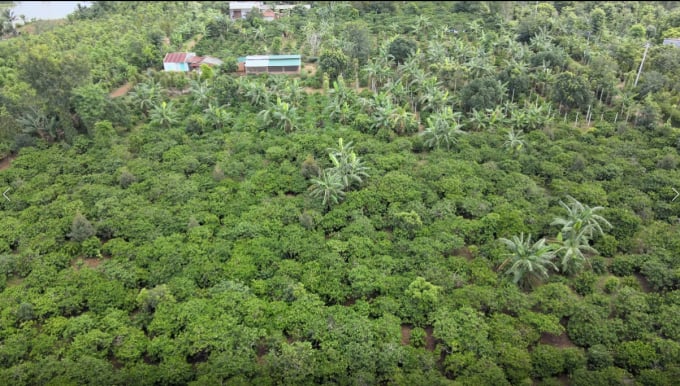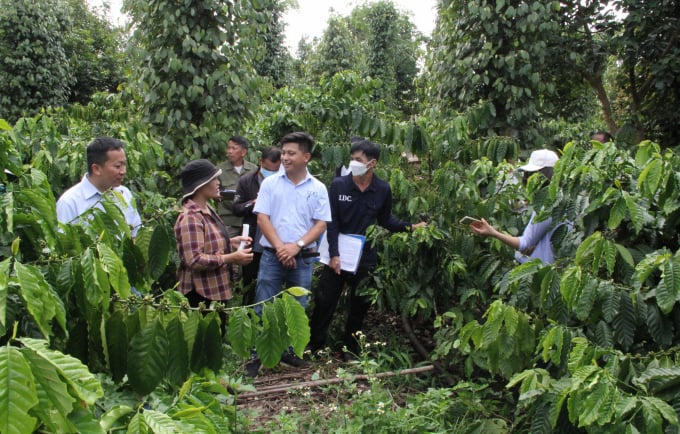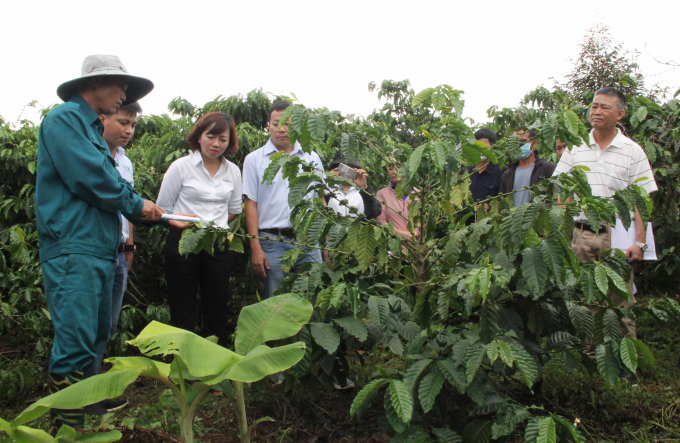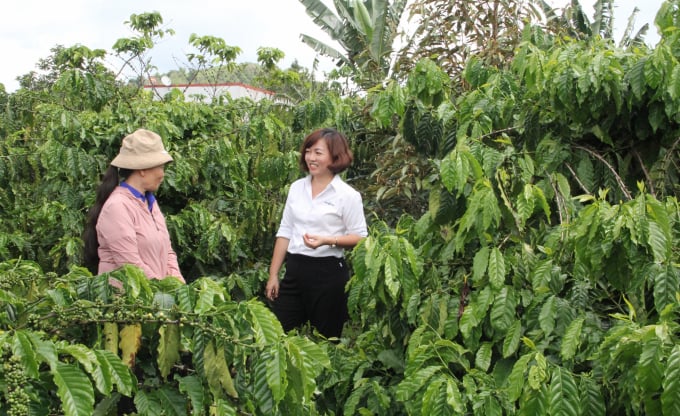May 18, 2025 | 11:35 GMT +7
May 18, 2025 | 11:35 GMT +7
Hotline: 0913.378.918
May 18, 2025 | 11:35 GMT +7
Hotline: 0913.378.918
On May 25, Louis Dreyfus Company in Vietnam (LDC), Jacobs Douwe Egberts (JDE Peet’s), the Sustainable Trade Initiative (IDH) and Syngenta Vietnam co-organized a conference to summarize sustainable coffee landscape project implemented in major coffee-producing provinces in the Central Highlands region including Dak Lak, Dak Nong and Gia Lai.

Sustainable coffee landscape project has helped transform regional landscapes and ecological environment in Krong Ana district. Photo: Quang Yen.
Coffee landscape project has been implemented from 2018 until June 2022. It aims at putting advanced and effective farming methods into practice; instructing local coffee growers to practise natural farming, reducing input materials and saving labor; using chemicals and fertilizers transparently, safely and responsibly; improving product quality and developing sustainable coffee production models for farmers.
The long-term goal of the project is to reduce soil degradation, to conserve water and to improve adaptation to climate change. The total investment for the project is US$1 billion in three years.
The project is designed to create a coffee landscape on an area of 30 hectares in Krong Ana district and 30 coffee landscape models (1-2 hectares each), intercropping coffee plants with fruit crops; applying new techniques to pest control as well as soil and fertilizer management; using crop production products safely and effectively; saving water in coffee production.

Coffee farmers in the Central Highlands region are visiting a coffee landscape model in the project area. Photo: Quang Yen.
Additionally, the project participants were trained on occupational safety such as assessing environmental risks and how to use protective equipment properly and safely.
According to the assessment results given in early 2022, 98% of coffee growers participating in the project in the provinces of Dak Lak, Dak Nong and Gia Lai used knowledge and took action.
Vu Minh Dai in Ea Cam village, Buon Trap town, Krong Ana district is among the project participants. His 3-hectare coffee garden has seen obvious changes over the years. Three years ago, only coffee plants were grown in his garden. Because all the plants were 20 years-old or above they were stunted and low-yield. Since he took part in the project his 3-hectare coffee garden has flourished again with different types of crops cultivated including fruitful coffee plants.
Dai said that 3 years ago he intended to cut down the trees in his garden to replant new ones because they were stunted and low-yield. Luckily, the project was implemented in his hometown and he was chosen to take part in. With the help of experienced experts Dai switched his garden to sustainable coffee landscape model.
“As a project participant, I was trained on new farming techniques to apply in coffee production; thereby significantly improving coffee yield and quality. I was also instructed how to intercrop coffee plants with other fruit crops to both increase my income and livelihood and prevent soil erosion. That encouraged me to grow plants in my garden with a very eco-friendly approach,” Dai said.

Vu Minh Dai (blue clothes) is instructing visitors how to switch to coffee landscape model. Photo: Quang Yen.
According to Dai, the biggest benefit when he participates in the project is the fact that he is instructed in safe and effective use of fertilizers and crop protection products by experienced experts. Not only that, Dai was trained on occupational safety such as assessing environmental and crop risks, using standard protective equipment to protect his health and surroundings.
Having opportunity to visit sustainable farming models, dozens of farmers from the provinces of Dak Lak, Dak Nong and Gia Lai appreciated the results brought by the project. They hoped the project would be replicated in other localities so that farmers could access advanced farming methods to develop their farms in a sustainable way.
Mr. Do Ngoc Sy, Sustainability Manager in Asia and the Pacific with Jacobs Douwe Egberts (JDE Peet’s), said: “We are proud of working with IDH, LDC and Syngenta to carry out the project. We want to promote the development of sustainable coffee programs in the Central Highlands.”
Sy highly appreciated great efforts from all stakeholders to benefit more than 7,000 coffee farmers. “With this cooperation, we will undertake to comply with our commitment of 100% responsibly sourced coffee by 2025 and enhance smallholders’ livelihoods,” Sy said.
Mrs. Le Thi Hong Nhi, Head of External Affairs and Business Sustainability – Syngenta Vietnam, said Syngenta was satisfied with the project results.

A local farmer is sharing happiness with Mrs. Le Thi Hong Nhi, Head of External Affairs and Business Sustainability – Syngenta Vietnam. Photo: Quang Yen.
Sustainable coffee landscape project has had a great impact on raising farmers’ awareness and skills of sustainable farming. As a stakeholder involved in the project, Syngenta Vietnam helped coffee farmers put sustainable farming methods into practice. Besides, the company instructed the local farmers in safe and effective use of crop protection products to both increase the yield and quality and protect health as well as conserve environment and landscapes.
“We pledge to accompany the project and coffee farmers to spread the model. We do hope that the project will be replicated in other localities across the country so that we can move towards sustainable and ecological agriculture,” Nhi said.
IDH, LDC, JDE Peet’s and Syngenta have carried out a similar project in Lam Dong province from 2016 until June 2022. The total investment for the project is over US$1.5 million. The project has helped nearly 3,800 coffee growers turn to sustainable coffee landscape models with a total area of 4,500ha.
Through the two projects, more than 7,000 coffee farmers along with over 10,500ha of coffee plants in four major coffee-producing provinces including Lam Dong, Dak Lak, Dak Nong and Gia Lai have received the benefit.
Translated by Mai Tham

(VAN) 14 out of 35 domesticated elephants in Dak Lak province have had their living conditions improved, with 11 of them currently participating in the non-riding elephant tourism model.

(VAN) Muong Nhe Nature Reserve hopes that being upgraded to a national park will lay the foundation for forest protection efforts to be carried out in a systematic, modern, and sustainable manner.
/2025/05/16/3923-2-171845_52.jpg)
(VAN) Lower costs, higher yields, and improved soil quality are outstanding benefits that soybeans bring when integrated into the crop rotation system.

(VAN) The 'For a Green National Environment' programme aims to promote a green lifestyle, support businesses in implementing ESG practices, and turn Net Zero commitments into concrete actions.

(VAN) Cold-barn systems efficiently manage environmental and temperature conditions, which aids in the prevention of respiratory diseases in pigs and protects them from the vectors that transmit African swine fevers.

(VAN) To tackle challenges, the project 'Addressing key technical bottlenecks in the grouper supply chain in Vietnam' has been underway since 2024.

(VAN) The project 'Disease-Resilient and Sustainable Cassava Production Systems in the Mekong Region', funded by the Australian Center for International Agricultural Research (ACIAR), is being implemented from 2024 to 2028.